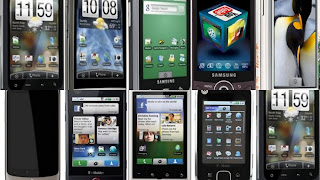How to choose an Android smartphone
 |
| Android Smartphone |
The mobile market is a brave and confusing new world. Buying an Android smartphone, for example, can be more complex than you'd ever imagine.
Let's start off by defining a smartphone. A smartphone is a category of mobile gadget that combines a phone and computer-like features, such as Web browsing.
It can also function as a camera, media player, GPS unit and more, depending on the apps you choose to download.
The term smartphone, however, is increasingly vague. Even low-cost feature phones, sometimes called dumb phones, offer many advanced options now. Smartphones, however, are generally set apart by offering large touchscreens and the ability to use apps.
Like a computer, smartphones have versatile operating systems. The two biggest in the U.S. are Apple's iOS and Google's Android. Microsoft's Windows Phone 7 is also making inroads. The latest "Mango" release adds a lot of excellent features like multitasking, Internet Explorer 9 and a significant speed boost on some gadgets. Still, WP7 has a ways to go before it becomes a threat to the other two.
Now, which Android phone should you buy? I have to say my first recommendation isn't an Android phone at all. For most first-time buyers, I recommend choosing an iPhone.
Don't get me wrong. Android is a great operating system, and Android smartphones are often top notch. However, they can get a bit complicated, so I don't recommend them for everyone.
For instance, it can be more dangerous to download Android apps. Apple has a well-regulated app store where it approves and monitors all the available apps. This makes it harder for hackers to slip malicious apps onto your phone.
With Android, the risks are higher. Google does have an official Android market, but Google polices it only loosely. And if you aren't careful, you can find yourself shopping at other Android app stores that have little or no quality control.
Now, Google's approach does mean that Android phones are more open. People who like control and tinkering with their phone love Android. However, for simplicity and safety, the iPhone is still the one to beat. Especially for newbies.
What if you're set on an Android phone? Then, there are plenty of models to choose among. You'll find multiple screen sizes and screen types.
You can get one with or without a hardware keyboard. Some manufacturers even throw in extra software goodies. Don't let all that noise confuse you.
What you most need to know is that you want to buy a phone with the latest version of Android's smartphone software. At the moment, that's 2.3 Gingerbread. All the other extras aren't that important.
For the hardware, choose whatever makes you comfortable. Go to a store and "test-drive" the display models. Is the phone easy to hold? Do you like the screen? Is it responsive to opening and switching apps? Do you prefer typing on a physical keyboard or on the screen?
Don't worry about storage sizes. Most Android phones let you use an SD memory card to add more space.
Double-check that the SD option is activated on the phone you want.
The salesperson will try to push 4G. Don't let that enter into your decision; it really isn't that big of a deal right now. Only buy a 4G phone if you actually like the phone best.
Know your price range going in. Most carriers offer lower-end Android phones, such as the LG Vortex, for free with a new contract. These are usually older phones running older software. I'd steer clear of them.
The mid-range Android smartphones, like the LG Enlighten, are $200 and under. These tend to be underpowered, so don't expect great performance with every app. However, they're fine for Web surfing, email and basic games and productivity tools.
The high-end Android models, like the Droid Bionic, generally range from $200 to $300. These will do everything but sit-up and beg. And I'm sure someone is working on an app for that.
If you'd like one of the more expensive models, go online to the provider's website. They sometimes offer Web-only deals, which will give you the best price. You can also find out if they have certified pre-owned units in stock. This option can save you about $50 to $100.













0 comments:
Post a Comment